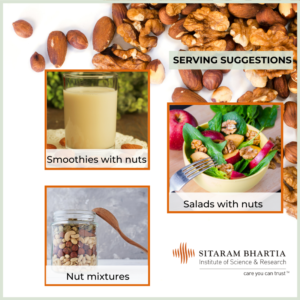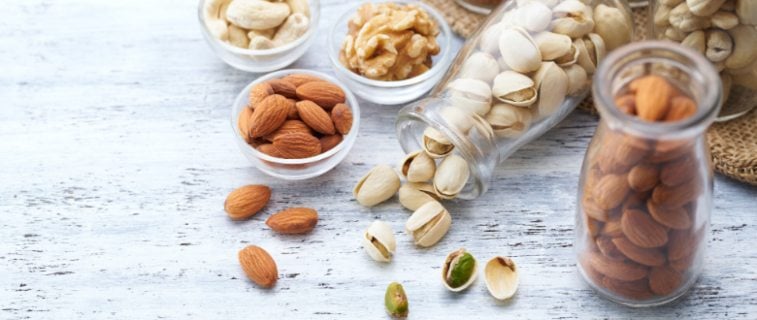A healthy heart lowers the risk of developing cardiovascular disease regardless of how old you may be. But did you know that good heart health could also reduce the risk of developing dementia and depression?
Despite the numerous benefits of maintaining a healthy heart and preventing cardiovascular diseases such as heart disease, stroke, arrhythmia, heart failure and heart attack, many of us, including those with risk factors like obesity, smoking and sedentary lifestyles hesitate to make a change.
According to a study by the Lancet, cardiac ailments led to more deaths than any other non-communicable disease in India (28%).
“If you thought heart damage occurs only in older people, think again. The study showed that more than half the deaths occurred in people below 70 years,” says Dr. Kartikeya Kohli, Consultant, Medicine at Sitaram Bhartia Institute of Science and Research.
How Can You Improve Heart Health?
A simple way to lower your risk of cardiovascular disease is to include nuts in your diet.
It is essential to understand the role of cholesterol when talking about heart damage. Cholesterol is a type of lipid or fat molecule found in our cells that is needed for certain functions. While our body produces cholesterol, it is also obtained from foods like egg yolk, red meat or full fat milk.
There are two types of cholesterol, low-density cholesterol (LDL) and high-density cholesterol (HDL). The low-density cholesterol, called ‘bad’ cholesterol, causes plaque (a waxy deposit) to build up in the arteries, leaving less room for the blood to circulate.
Plaque can also rupture in the arteries, causing fats and waste products to spill over. In response, platelets try to limit the spill over by creating a blood clot. If this happens in a coronary artery and the blood clot is quite big, it could lead to a heart attack. If this happens in an artery in the brain or carrying blood to the brain, it could result in a stroke.
The high-density cholesterol (HDL) or ‘good’ cholesterol removes the LDL from the bloodstream and returns it to the liver where it is broken down and flushed out.
High levels of LDL increase the risk of heart disease while high levels of HDL are associated with a lower risk.
So How Do Nuts Keep the Heart Healthy?
Research has found that people who eat nuts often are less likely to have a heart attack or die from heart disease compared to those who rarely eat them.
Studies show that nut consumption may influence cardiovascular health by improving blood lipid levels, endothelial function, reducing the risk of weight gain and via antioxidant and anti-inflammatory effects.
In other words, nuts are good for the heart because they may
- Decrease ‘bad’ cholesterol levels
- Reduce risk of developing blood clots which maybe fatal
- Decrease inflammation linked to heart disease
- Help control high blood pressure
What Makes Nuts Healthy?
Nuts contain many minerals, proteins, nutrients and healthy fats such as:
- Unsaturated fats which include monounsaturated and polyunsaturated fats.
“Monounsaturated fats (MUFA) may lower total and LDL cholesterol without affecting HDL cholesterol. These also do not cause inflammation that maybe linked to some omega-6 fatty acids. By substituting carbohydrates with MUFA, you also lower chances of spikes in blood sugar.
“Polyunsaturated fats are vital for body functions but are not made in the body, which is why we need to get them from food. They are required for blood clotting, inflammation and muscle movement. Polyunsaturated fats are of two types, omega-3 fatty acids and omega-6 fatty acids. Both of these fats help lower ‘bad’ cholesterol levels and reduce the risk of heart disease and stroke. “
- Omega 3 fatty acids which have been found to lower the risk of irregular heartbeat and a fast heart rate that could lead to stroke or heart failure in elderly people.
- Fiber which apart from lowering cholesterol makes you feel full so you eat less.
- Vitamin E: This is also known to stop the development of plaque in the arteries.
- Polyphenols that reduce the risk of cancer.
- Plant sterols which may be one of the most potent ways of naturally lowering LDL cholesterol.
- L-arginine which is an amino acid that improves immunity and growth. Our body also uses L-arginine to create nitric oxide which makes the artery walls flexible and less prone to blood clots.
Not all nuts contain the same nutrients, which is why it is good to include various nuts so that you get the benefit of them all.
Even though nuts are nutritious, they should be consumed in limited portions.
How Much Should You Eat?
Nuts are heart healthy but they’re also high in calories.
The American Heart Association recommends about 4 fistfuls of unsalted nuts a week, meaning the amount of nuts that would fit into your fist.
Because nuts contain polyunsaturated and monounsaturated fats or ‘good’ fats, these should replace the ‘bad’ fats (trans fats and saturated fats) in your meals. These fats are found in packaged and processed foods, whole milk, cheese, coconut oil and red meat.
Which Nuts Should You Eat?
All nuts are good and should preferably be eaten raw, unsalted and uncoated with chocolate or sugar.
You could opt for either raw or roasted nuts because both are similar in calorie and fibre content. Roasting may, however, affect the nutritional value of nuts depending on how they are roasted.
- Walnuts are rich in omega-3 fatty acids and contain fibre and protein. Many studies have found that walnuts help in lowering LDL and increasing HDL cholesterols, in addition to improving blood pressure and blood flow in the body.
- Almonds which contain vitamin E, fibre and monounsaturated fat help in lowering total cholesterol and LDL. A study found that eating an ounce of almonds with a meal also lowered the rise in blood sugar by as much as 30% in people with diabetes. Almonds have also been seen to encourage the growth of gut friendly bacteria.
- Pistachios too can increase HDL levels, improve blood pressure and weight both of which if not managed may increase the risk of heart disease. They also contain components of vitamin E, called β-tochopherols and γ-tocopherols, which have antioxidant properties. γ-tocopherols help improve blood vessel health. Pistachios can also help lower blood sugar after a meal.
- Peanuts, although legumes and not nuts, are an affordable and healthy food which like nuts have been associated with decreased overall and cardiovascular disease mortality according to a study.
“When we suggest snacking on nuts instead of biscuits or chips, we often get queries about nut butters and nut oils,” says Dr. Kartikeya, “people tend to assume that copious amounts are safe to consume.”
Are Nut Oils and Nut Butters Healthy Alternatives to Dairy Products?
Nut oils and nut butters may be healthy but not all nut butters have the same fibre content as whole nuts.
“When picking a packaged nut butter off the shelves or ordering it online, we’d ask you to exercise caution. Read the ingredients and avoid those that contain hydrogenated oils as these can increase LDL levels. “
Be wary of butters that contain a lot of sugar and flavours. These will be high in calories, make you gain weight and have little or no added benefit of the nuts they are supposed to contain.”
If you’re someone who likes to experiment or have turned vegan, replacing dairy cream with cashew cream could be a great alternative.
Be mindful of the way you include nuts in your diet to take strides toward better heart health.
Serving Suggestions
You can eat nuts in many different ways. You can eat them as is, like a snack, carry them around in a jar, sprinkle them in salads or blend them in smoothies.

Conclusion
Nuts are a natural super food that can do wonders for your immunity and heart.
But don’t rely entirely on nuts for your well-being.
Incorporate them into a diet plan that consists of antioxidants, vitamins and fibre from daily portions of fruits and salads and healthy proteins from pulses, tofu, fish or lean meats.
“Limit your consumption of sweets, flours and starchy vegetables like potatoes. Also try to walk for about 30-45 minutes each day, and you’ll do just fine,” finishes Dr. Kartikeya.


